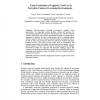Free Online Productivity Tools
i2Speak
i2Symbol
i2OCR
iTex2Img
iWeb2Print
iWeb2Shot
i2Type
iPdf2Split
iPdf2Merge
i2Bopomofo
i2Arabic
i2Style
i2Image
i2PDF
iLatex2Rtf
Sci2ools
123
click to vote
AIED
2011
Springer
2011
Springer
Early Prediction of Cognitive Tool Use in Narrative-Centered Learning Environments
Narrative-centered learning environments introduce novel opportunities for supporting student problem solving and learning. By incorporating cognitive tools into plots and character roles, narrative-centered learning environments can promote self-regulated learning in a manner that is transparent to students. In order to adapt narrative plots to explicitly support effective cognitive tool-use, narrative-centered learning environments need to be able to make early predictions about how effectively students will utilize learning resources. This paper presents results from an investigation into machine-learned models for making early predictions about students’ use of a specific cognitive tool in the CRYSTAL ISLAND learning environment. Multiple classification models are compared and discussed. Findings suggest that support vector machine and naïve Bayes models offer considerable promise for generating useful predictive models of cognitive tool use in narrative-centered learning enviro...
AIED 2011 | Artificial Intelligence | Classification Models | Cognitive Tool | Support Vector Machine |
| Added | 24 Aug 2011 |
| Updated | 24 Aug 2011 |
| Type | Journal |
| Year | 2011 |
| Where | AIED |
| Authors | Lucy R. Shores, Jonathan P. Rowe, James C. Lester |
Comments (0)

